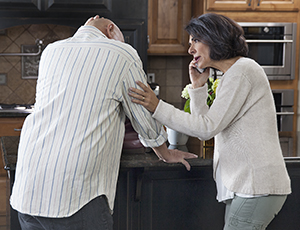Head Trauma (Traumatic Brain Injury)
Head Trauma (Traumatic Brain Injury)

Don't move a person with a head injury unless it is necessary to save his or her life. Call 911 and wait for help. Head trauma often comes with severe neck injury. Sudden movements can result in paralysis.
Call 911
Call 911 immediately after a head blow that results in:
-
Prolonged loss of consciousness (more than a few seconds) or prolonged drowsiness
-
Memory problems or confusion
-
Severe headache
-
Nausea or vomiting
-
Pupils dilated or different sizes
-
Severe bleeding
-
Blood or watery fluid leaking from nose or ears
-
Broken skull or a soft spot on skull
-
Slow breathing
-
Loss of balance
-
Weakness of or trouble using an arm or leg
-
Slurred speech
-
Seizure
What to expect in the ER
Here is what will happen:
-
A neurological exam is done. This is a series of simple questions and tests that evaluate the nervous system. Reflexes, movement, response to commands, response to pain, and mental state are assessed.
-
The healthcare provider shines a bright light into the eyes to check how the pupils respond. This can reveal more about any head injuries.
-
A CT scan may be done. This test combines X-rays and computer scans to create detailed images of the brain to detect bleeding, swelling, brain injury, and skull fractures
-
An MRI scan may be done. This test detects minute bleeding (microhemorrhage), bruising, and scarring which may not be visible on CT scanning.
Treatment for head trauma
Here is what is generally done:
-
Sometimes, severe head injuries cause bleeding on the brain that needs to be treated right away with surgery. In certain cases, the injured person will be watched closely and taken for surgery only if injuries become worse. After surgery, special care helps prevent further brain damage.
-
Minor head trauma may need little treatment beyond pain control and observation. The healthcare provider may suggest using cold packs to reduce swelling and pain.
Once you are home
At home, call 911 immediately if the affected person:
-
Becomes very drowsy or confused
-
Has a headache or trouble seeing
-
Has a stiff neck or muscle weakness
-
Vomits
-
Has seizures
-
Has bruising around the eyes or behind the ears
-
Has any blood or clear fluid coming out of the ears or nose
Updated:
January 23, 2020
Sources:
Initial Approach to Severe Traumatic Brain Injury in Children. UpToDate
Reviewed By:
Sather, Rita, RN,Shelat, Amit, MD